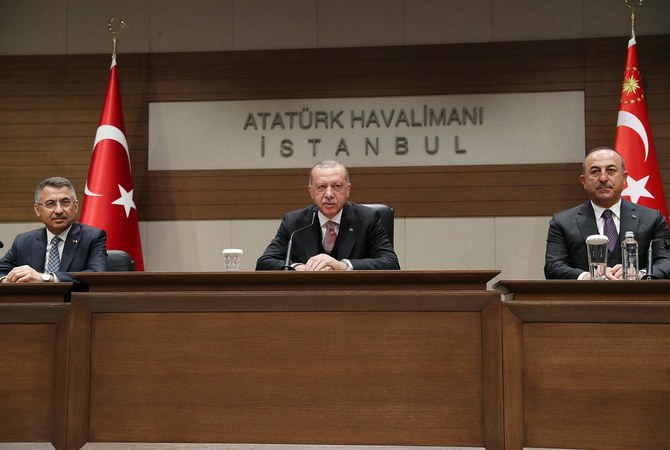ISTANBUL: Turkey’s main opposition party, the Republican People’s Party (CHP), has put the presidency’s use of state aircraft under the spotlight with a question that has been left unanswered.
Vice President Fuat Oktay did not answer Deputy Chair Ozgur Ozel’s parliamentary question about the issue, claiming that there was not enough public information. He then readdressed the inquiry to the Ministry of Transport and Infrastructure.
However, the ministry stated that they did not have any evidence regarding the number of and reasons for the use of aircraft — both planes and helicopters — by the presidency.
What the CHP had wanted to elucidate was clear and simple: Why the aircraft used by the presidency had been registered as “security aircraft”, how many aircraft were owned by the government and where they were located.
“The lack of seriousness in the response to our parliamentary inquiries shows why we stood against the unconstitutional reform of April 16 and the twists of this new regime,” Ozel said in a press conference in the parliament.
On April 16, Turkey’s political governance system switched to a presidential system, granting excessive and almost unchecked powers to the president.
Ozel also said that the unaccountability of the presidency on the use of aircraft is another sign of the presidential regime’s impact on the parliament, which is being weakened.
A court recently blocked access to an article in Turkey’s dissident Cumhuriyet newspaper, which had reported that the Istanbul municipality demolished an illegal construction overlooking the Bosphorus, built by Turkey’s Presidential Communications Director Fahrettin Altun.
An investigation was also launched into the report, which the prosecutor’s office accused of putting Altun into the “target of terrorist organizations” by sharing pictures of his residence and full address. The reporters and managers of the newspaper gave their testimonies on Thursday.
Opposition parties criticized the investigation.
“If a newspaper is to be accused of ‘terror charges’ for reporting an illegal construction, what a pity for the ruling power,” IYI Party Vice-chairman Aytun Ciray said during a televised speech on April 19.
In the meantime, CHP Istanbul Chair Canan Kaftancioglu also deposed to the prosecutor’s office on Thursday as part of the investigation launched against her for photographing Altun’s house and sharing the pictures her social media account.
“Those who have something to hide panic. Calm down, boys,” she tweeted.
Kaftancioglu is credited as the key person behind Istanbul metropolitan mayor Ekrem Imamoglu’s electoral victory during the March 2019 local elections and the June 2019 repeated elections. The secular challenger ended the 25 year-rule of the AKP and its predecessor’s rule in the city.
The same Cumhuriyet newspaper has long been at the center of government’s attacks for its other investigative journalism reports, especially the one concerning President Recep Tayyip Erdogan’s son-in-law, Finance Minister Berat Albayrak.
The report claimed that Albayrak had purchased land on the route of the government’s controversial mega-project, Kanal Istanbul, in 2012 to make profits.
Another Turkish court blocked access to relevant news on the minister's land purchase along the project route. The reporter faces up to two years in jail.
The project, whose first tender was recently held amid the coronavirus disease pandemic, aimed at linking the Black Sea and Marmara Sea through an artificial shipping canal. Once the project starts, the land along its route will be very valuable.
Turkey has ranked 154 out of 180 countries in the Reporters Without Borders’ recently announced 2020 World Press Freedom Index.


























